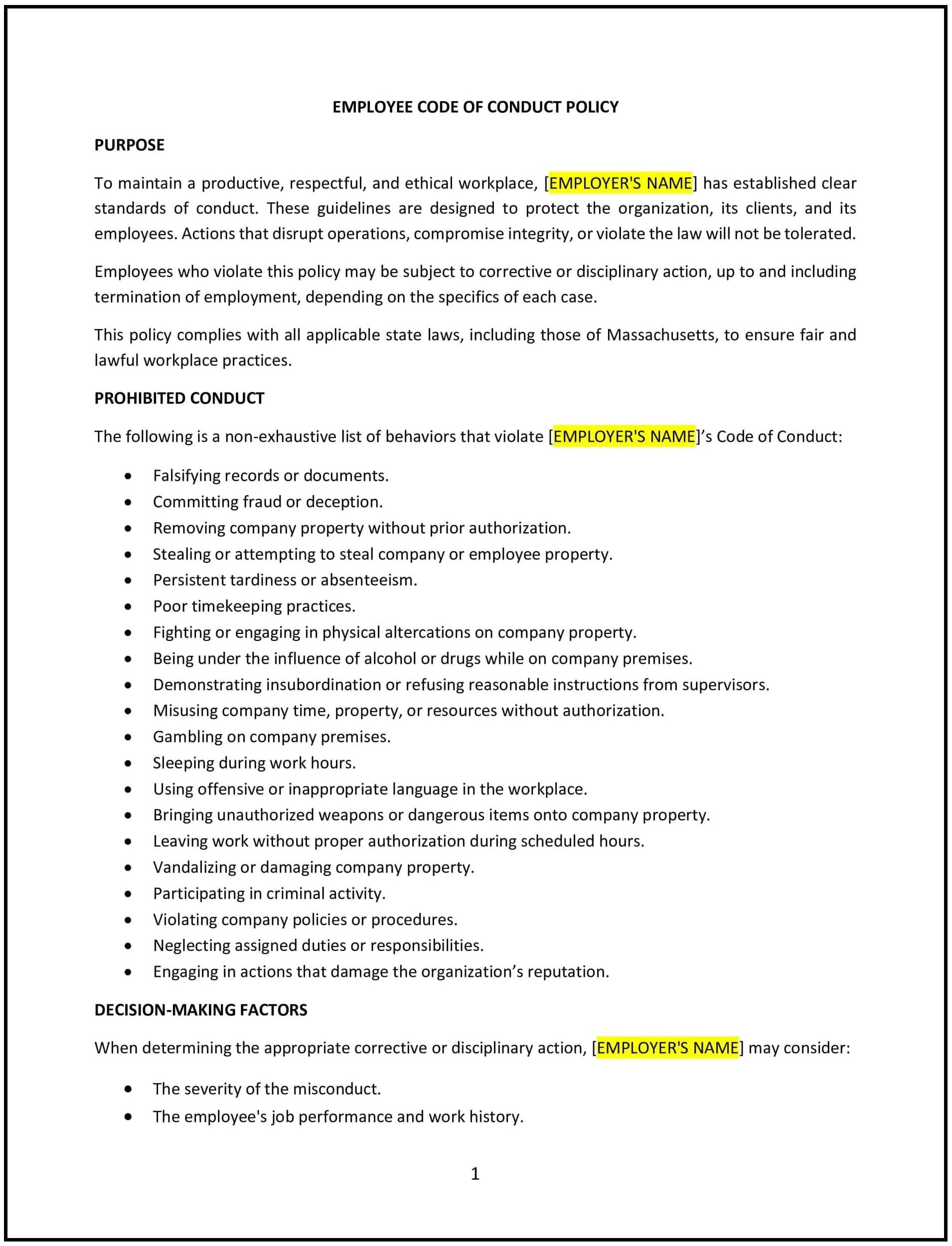Standards of conduct policy (Massachusetts): Free template
Got contracts to review? While you're here for policies, let Cobrief make contract review effortless—start your free review now.

Customize this template for free
This standards of conduct policy is designed to help Massachusetts businesses set clear expectations for employee behavior in the workplace. The policy outlines the company’s standards for ethical behavior, professionalism, and adherence to company values, creating a respectful and productive environment for all employees. It also enhances compliance with Massachusetts state laws, federal regulations, and industry standards regarding employee conduct.
By adopting this policy, businesses can promote a positive work culture, reduce the risk of workplace conflicts, and provide clear guidelines for addressing inappropriate behavior.
How to use this standards of conduct policy (Massachusetts)
- Define acceptable behavior: Clearly outline the expected standards for employee behavior in the workplace, including professionalism, respect for colleagues, punctuality, and adherence to company policies. The policy should include guidelines for how employees should interact with one another and with management.
- Specify prohibited behaviors: The policy should list behaviors that are considered unacceptable, such as harassment, discrimination, theft, dishonesty, substance abuse, or violations of company policies. Make it clear that these behaviors will not be tolerated and will result in disciplinary action.
- Address workplace conduct: Detail the company’s expectations for workplace conduct, including the appropriate use of company resources, maintaining a clean and organized work environment, and respecting the privacy of others. Specify that employees should act in a way that reflects positively on the company both in and outside the workplace.
- Provide guidance on resolving conflicts: Outline the steps employees should take if they encounter conflicts with colleagues or management. The policy should encourage open communication, respect, and collaboration when resolving issues. Include information on how employees can report misconduct or seek assistance from HR.
- Specify disciplinary actions: Define the disciplinary actions that may be taken if an employee violates the standards of conduct. The policy should outline a graduated approach, starting with verbal warnings and progressing to written warnings, suspension, or termination for repeated or severe violations.
- Ensure compliance with Massachusetts and federal laws: Ensure that the policy complies with Massachusetts state laws, such as the Massachusetts Fair Employment Practices Act, and federal regulations, including the Equal Employment Opportunity (EEO) laws and Occupational Safety and Health Administration (OSHA) guidelines.
- Review and update regularly: Periodically review and update the policy to ensure it is compliant with changes in Massachusetts state laws, federal regulations, and the evolving needs of the company.
Benefits of using this standards of conduct policy (Massachusetts)
This policy offers several benefits for Massachusetts businesses:
- Promotes a positive work environment: Clear standards of conduct help foster a respectful, professional, and productive work culture where employees feel valued and supported.
- Reduces workplace conflicts: By establishing clear expectations for behavior, businesses can reduce misunderstandings, conflicts, and inappropriate behavior in the workplace.
- Protects the company’s reputation: Employees who understand and follow the company’s standards of conduct are more likely to behave in ways that protect the business’s reputation and credibility.
- Enhances employee accountability: The policy encourages employees to take responsibility for their behavior and actions, fostering a sense of accountability and personal ownership of their conduct.
- Promotes legal compliance: By addressing behaviors that violate state and federal laws, the policy promotes compliance with Massachusetts state laws and federal regulations, reducing the risk of legal disputes and liability.
- Improves employee morale and retention: Employees who work in an environment that prioritizes ethical behavior and professional conduct are more likely to stay with the company and feel positive about their work environment.
Tips for using this standards of conduct policy (Massachusetts)
- Communicate the policy clearly: Ensure that all employees are aware of the standards of conduct policy and understand the company’s expectations. Provide the policy in the employee handbook, post it in common areas, and review it during onboarding and training sessions.
- Provide training and education: Offer training programs that help employees understand the importance of maintaining high standards of conduct and how to behave professionally in various workplace situations. This can include training on harassment, discrimination, and conflict resolution.
- Lead by example: Management should model the behavior outlined in the policy to set an example for employees. When leaders demonstrate the company’s standards of conduct, employees are more likely to follow suit.
- Address issues promptly: When a violation of the standards of conduct occurs, address it quickly and appropriately. The policy should provide a clear process for reporting and resolving issues, ensuring that concerns are taken seriously and handled with fairness.
- Promote a respectful work culture: Encourage employees to treat one another with respect, valuing diversity and fostering inclusivity in all aspects of their work. This will help create a positive atmosphere where all employees feel welcome and respected.
- Review and update regularly: Periodically review the policy to ensure it reflects current best practices, complies with legal requirements, and aligns with any changes in the company’s values or operations.